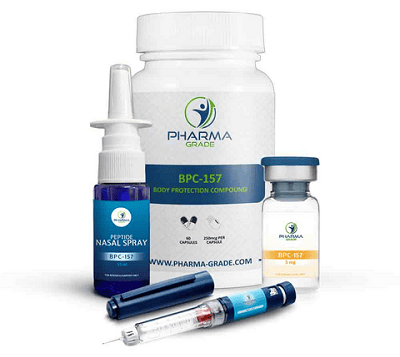
Imagine a peptide so powerful it could help heal tendons, protect your gut, and possibly even support brain function all without breaking a sweat. Sounds like science fiction? Welcome to the very real world of BPC-157.
Originally derived from a protein in human gastric juice, BPC-157 short for "Body Protection Compound 157" has become a standout subject of clinical interest in Switzerland’s research community. Its regenerative potential touches nearly every tissue type: muscle, nerve, tendon, skin, and even intestinal linings.
Which BPC-157 Product Best Matches Your Research?
At PharmaGrade Store Switzerland, precision meets flexibility. Whether you’re designing in vivo studies or in vitro tests, there's a BPC-157 format ready for action:
BPC-157 Peptide Vial
-
Form: Lyophilized powder for injection
-
Usage: Reconstitution required with bacteriostatic water
-
Dosages Available: 2mg, 5mg, or 10mg
BPC-157 Nasal Spray
-
Form: Ready-to-administer nasal solution
-
Sizes: 15ml and 30ml
-
Advantage: Non-invasive peptide delivery
BPC-157 Pre-Mixed Peptide Pen
-
Form: Pen kits pre-filled with BPC-157 and bacteriostatic water
-
Dosage: 5mg
-
Ideal for: Streamlining dosage accuracy and ease of use in lab settings
BPC-157 Capsules
-
Form: Oral capsule with high bioavailability
-
Best for: Gut health and systemic peptide research
Each format is designed with scientific precision to meet your clinical needs no unnecessary guesswork, just clean, compliant research-ready peptides.
Why BPC-157 Is Creating Buzz in Swiss Labs
If your research focuses on inflammation, injury recovery, or gastrointestinal health, BPC-157 offers a range of biologically relevant benefits worth investigating:
Promotes Tissue Repair and Wound Healing
BPC-157 promotes angiogenesis the formation of new blood vessels. More vessels mean more oxygen and nutrients to injured areas, speeding up recovery and reducing inflammation.
In fact, How BPC-157 Enhances Muscle and Tendon Repair demonstrates its potential to significantly improve recovery times in both muscle tissue and tendon injuries, offering a unique solution to tissue damage.
Potential Cognitive Enhancement
Preclinical data suggest BPC-157 may help modulate neurotransmitter activity, reduce oxidative stress, and promote neurogenesis. Could it improve memory or cognitive resilience? Early signs point to maybe yes.
Gut Protection
This peptide helps heal gastric ulcers, reduce inflammatory markers, and protect intestinal lining integrity. Think of it as duct tape for your digestive tract.
Immune System Modulation
BPC-157 has been shown to regulate immune cell activity, shifting the balance away from inflammation and toward healing. For researchers, that’s a goldmine of therapeutic possibilities.
Real Talk from the Lab
Dr. Lina M., a fictional Swiss immunologist, once joked mid-trial:
“If BPC-157 were a lab assistant, it would’ve already fixed my knee and labeled all the test tubes.”
While obviously not literal, her point stands this peptide’s tissue-repair capabilities aren’t just promising; they’re almost annoyingly effective in early-stage testing.
What Does the Science Say?
Switzerland-based clinical and preclinical studies are exploring BPC-157 in areas like:
-
Tendon and ligament repair
-
Bone regeneration
-
Post-surgical healing
-
Inflammatory bowel disease (IBD)
-
Traumatic brain injury (TBI)
-
Arthritis and joint inflammation
Its strong anti-inflammatory and pro-regenerative properties have even made it a candidate for combination peptide therapies.
BPC-157 + KPV Peptide Stack
This stack is being explored for gut-related conditions, with both peptides contributing anti-inflammatory effects and improved mucosal healing. Studies suggest this combination may accelerate recovery from gastrointestinal distress or chronic gut inflammation.
BPC-157 & Thymosin Beta-4 Capsules
Pairing BPC-157 with Thymosin Beta-4 may offer a synergistic approach to muscle recovery, joint regeneration, and post-exertion repair. Whether you're testing injury rehab protocols or immune modulation, this capsule combo is becoming a go-to in clinical pipelines.
Go to Homepage
BPC-157 Peptide Specifications
| Attribute | Detail |
|---|---|
| Sequence | Gly-Glu-Pro-Pro-Pro-Gly-Lys-Pro-Asp-Asp-Ala-Gly-Leu-Val |
| Molecular Formula | C₆₂H₉₈N₁₆O₂₂ |
| Molecular Weight | 1419.5 g/mol |
